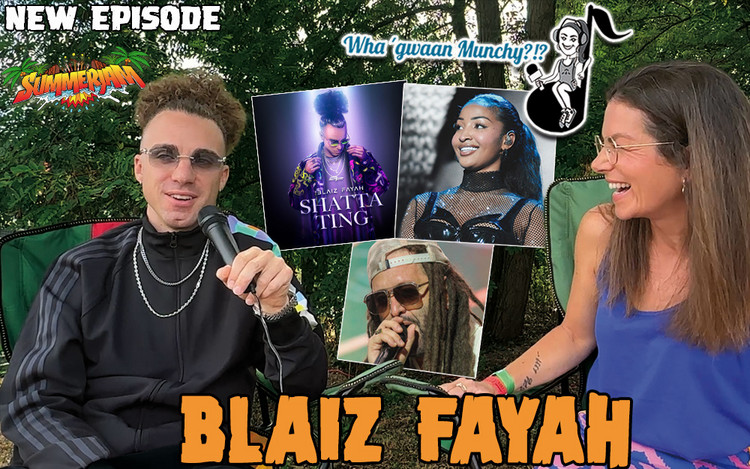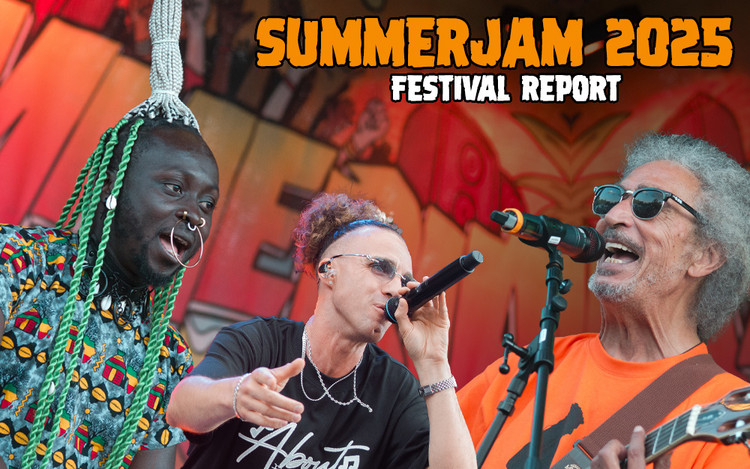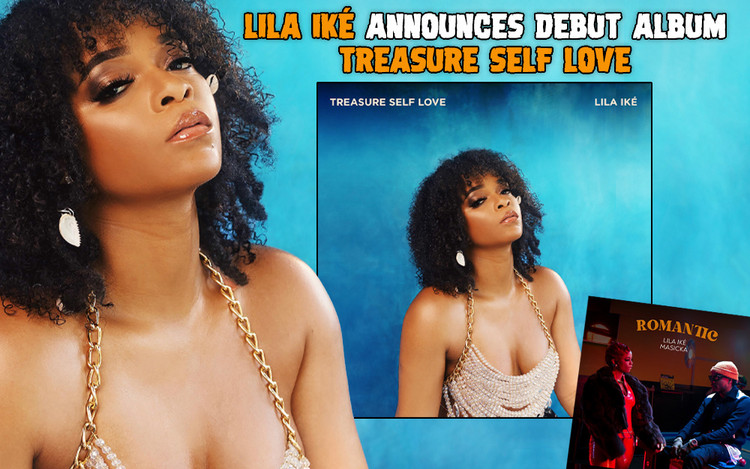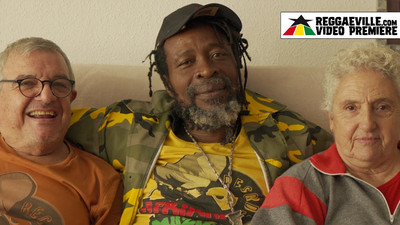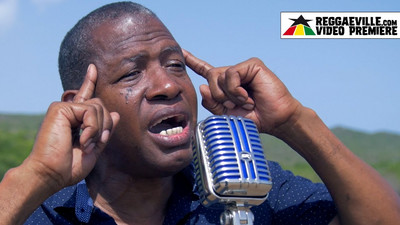Exco Levi ADD
Interview with Exco Levi
03/20/2015 by Dan Dabber
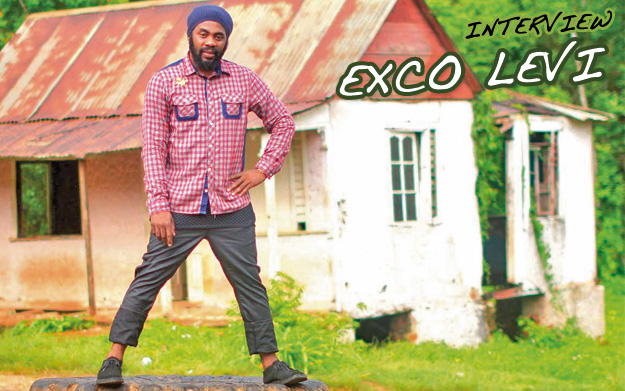
Reggaeville caught up with three-time Juno Award winning reggae artist, Exco Levi, a day before he was to find out if he had won his fourth. Skyping from his hotel room at the award show festivities in Hamilton, Ontartio, he sat in front of two giant, poster-sized blow ups of the cover from his new album, Country Man, as he spoke with us about his musical origins, his migration to Canada, his inspirations for the album, and much more.
Spoiler alert, Exco received his fourth Juno Award for “Reggae Recording of the Year” the day after our conversation.
I assume you grew up listening to reggae and dancehall. What other musical influences did you have growing up?
Well, I grow up in the church. So it was mostly gospel music. My grandfather and grandmother, they are Christians. So, mostly gospel music, but you’d hear reggae music played on sound systems around the community even before you were allowed to attend a dance, you would hear it in the distance... Sound box would show up in the street and the wind would bend the sound all around. So, it’s a part of our culture. When you grow up you realize that and you start to listen to the Bob Marley and the Peter Tosh and you start to learn about these guys. So I and I was just build my career around those icons, respecting them for what they have done for our culture, for our music. So in the country we listen to many different artists, you know? Love the grassroot of the business. Yah man.
How did you first discover YOUR musical talents?
Well basically, my daddy’s from Clarendon. Clarendon a neighboring city to Manchester. And my dad used to deejay on sound system in the 80’s. You know, so he used to deejay with a sound system called Super Soul. In the 80s, you know, sound used to have their own deejay, their own artists. So, when he was fifteen he left from Clarendon, come to Manchester for a dance... that’s how he meet my mom. That’s how I came about, you know? So I born... come up see my dad deejaying. I mean… artist. He never got a big break per se, but he was a community artist, a parrish artist. He’s known across the parish for being a great deejay. So that’s how I came about.
You mentioned that you were raised Christian. When did you start prescribing to the ways of Rasta?
Well, really and truly still, a man, as Bob say, a man is who they is. I was born a Rasta, but I just come to realization now... A man comes to the realization of who he really is, you know, and that comes with time. So after leaving high school, I start to read a lot and start to realize that it’s not only gospel music which I grew up on as the only spiritual music, there are many genres of music that is also spiritual and uplifting. So I choose the conscious reggae and I choose my inspiration through Rastafari and it does guide me. So I wouldn’t say I discovered.. I just come to the realization of who I am and it come with time. You understand?
What do you think was the hardest part about moving from rural Jamaica to urban Canada?
Well, at the time it wasn’t hard for me not be in Jamaica… No matter how nice Jamaica is… As a youth growing up in Jamaica you go through struggles, you go through trials and tribulations. Bob Marley at one time in his life lived in the states. So I just do the same thing. I and I do, yuh know? I came to Canada for a better life and better opportunity, to create opportunities for my kids and my for whole family back in Jamaica. That was the main reason. And i came here but music is very jealous. So, if music choose you, you can try a million things, it’s gonna lead you back to music. Because I tried working in a factory, I tried to do everything- good and bad. I’m no afraid to say that. And it lead me right back around to Rasta. Right back down to conscious music. So I give thanks, you know? 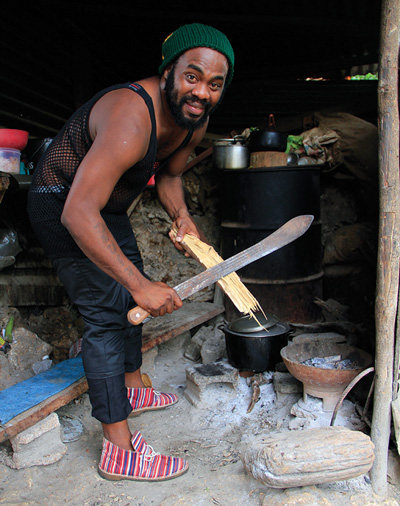 You mentioned that you worked in a factory, there’s a tune on the album called Life in the Factory. What other kinds of things did you do for work besides working in the factory?
You mentioned that you worked in a factory, there’s a tune on the album called Life in the Factory. What other kinds of things did you do for work besides working in the factory?
Well, Life in the Factory is very… it’s one of my biggest song in Canada. Because, yah see, Canada is for working class people, people who work for family, get up, you know... So everybody in Canada across the diaspora, they can relate to a song like that. And that’s how it came about… But when I came to Canada I was 24 years of age, you know? And I never have a job in Jamaica. So this is my first time going to the factory, listen to what the supervisor says, pushing me around. Telling me say, “Listen, make sure this done by tomorrow.” And I’m saying that to say this... I was watching an interview with Damon Dash that he did on a radio station and they were conversating about the same issue. He’s saying that, basically, your kids shouldn’t work. And they ask him, “Why do you say that?” The man said, listen, “You fi set the precedent that when your kids grow up, they don’t have to work. They will inherit what you provided. And then your kid will keep that precedent until his kids arrive.” That’s his belief, that’s Damon Dash’s belief. He said he don’t believe that you should get up everyday and go to job. Create things for your own. Try invest your money in yourself, in your last name. So your kids can able to benefit from what you do. You know?
Yeah. I think that’s good advice.
So, working in the factory was hard for me and I remember once... Once an Italian man said to me in Canada, he said, “Listen, you know what’s the difference between us as Italians and you as African-Jamaicans? All you do is just try to get a job. We try to OWN companies.” And I will never forget that. So I make a vow to myself. I say, listen, music is my calling. I’m just gonna do music, you know? Through sufferation, through pain, through tribulation, through discouragement and I just choose to do that and I’ve been doing it and the Almighty been good to me that he have rised me past the worst. I’m able to take care of my family, they eat from what I do. So I give thanks.
Tell me about the reggae scene in Toronto.
Well, the reggae scene... I mean right now I’m in Hamilton. It’s a neighboring city to Toronto and they’re hosting the Juno Awards this year. I’m actually at the Juno Awards. I’m in the hotel room… This is my Juno ticket [holds up a pair of bright, giant passes] for the Gala. Because you know, I’m nominated for the fourth time in the Juno awards. The Juno Award is like a Grammy in Canada. It’s like the biggest music award over here. I won three time already and I’m nominated this year so I’m actually there now. I perform live last night at the Fest, tonight is the Gala. You know? So, I mean… reggae is not the main music in Canada. Canada has the 33rd largest population on Earth with the 7th largest music industry. However, reggae is not the main music here. They have many genre of music. However, reggae music STILL able to reach the masses because you have a lot of artists here from Jamaica… most immigrants from Jamaica, we came here with our music. And we came here holding up the flag of Bob Marley and Peter Tosh and Garnet Silk and Jacob Miller and all those great icons who had already set the stage for us from them time. So, I wouldn’t say it’s number one, but the music in Toronto, in Canada, have it’s crowd, have it’s following. Because immigrant from Jamaica come here, reggae music dem waan hear. And there’s a lot of people of different colors, I don’t like to say white people, but people of different color who love reggae music and cherish it, you know? So, them love it. Them love it here in Canada.
You’re working with Penthouse Records on this album, mostly… Most of the tunes are Penthouse produced. How did you come to link up with Penthouse?
Well, I was introduced to Penthouse by Richie Stephens. He brought me to Penthouse. So big up Richie Stephens. That’s how I get the link with them.
You’re working with Donovan Germain, he’s one of the most legendary producers alive in reggae music. What’s the most important thing you’ve learned from working with Donovan Germain?
[laughs] A lot. For one, I’ll always remember, Never say you can’t. TRY! [laughs]
[laughs]
[laughs] Don seh yah cyant! TRY!
That’s more good advice! I was going through the tracks on the album, and by my count there are only three that have been released previously in some form. Under My Sheet and Life in the Factory are on the EP (Words of the Wise EP) from last year. Storms of Life was on the Silly Walks LP (Storms of Life Riddim Selection), and you won the Juno for Storms of Life last year. The rest of the tracks, they’re exclusive to this album. Is that correct?
Yes. All exclusive.
The album tells your story, so was the bigger story in mind when you were writing the tracks? Or was it something that developed organically that you just got a hold of later?
Well, it just happened naturally. I wrote the Country Man song in England. When I summarize the name for my album, when I listen back to the songs, I realize that all of the songs them, they are organic and they are my experience, you know? I mean, Storms of Life… Life in the Factory, One Room Shack on the mountain. All them song, I realize... I seh, you know, name it Country Man. We decided.. Me and Gappy Ranks named the album.
Oh, Gappy helped named it?
Yeah...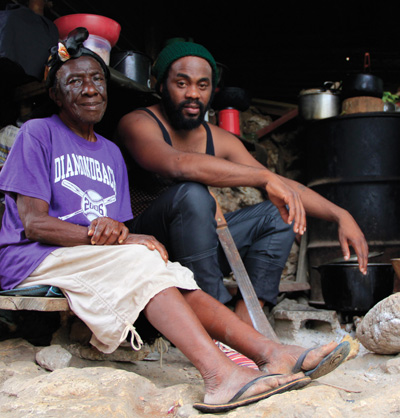 Because I was wondering about the title. You actually cover a couple songs on the album. For two of them you bring in the artists who originally did the tunes. So there’s Michael Rose on there, there’s Jahmali on there. But you cover the Twinkle Brothers’ Since I Throw the Comb Away. That’s from their 1980 album CountryMEN. So I was wondering if that’s just a coincidence?
Because I was wondering about the title. You actually cover a couple songs on the album. For two of them you bring in the artists who originally did the tunes. So there’s Michael Rose on there, there’s Jahmali on there. But you cover the Twinkle Brothers’ Since I Throw the Comb Away. That’s from their 1980 album CountryMEN. So I was wondering if that’s just a coincidence?
Ah first me a hear that. First me a know that. The Almighty have a way to work, you know? It ah work inna way that is mystical. Because, that the first I and I ah know that... And I was introduced to the Twinkle Brothers by a friend here in Canada. He gave me a CD with the Twinkle Brothers from when they performed at Sunsplash 1981. That’s the same year I was born! And I listened to the CD and I LOVE these guys! You know? And I never sing a cover song before, but I’m going to sing Since I Throw the Comb Away. Yeah.
How about the other artists that you featured on the album - Michael Rose, Jahmali - how do they play into your bigger story? Isn’t Jahmali from Clarendon?
Yeah, Jahmali’s from Clarendon. But that song (El Shaddai) is my favorite Penthouse record of all. When I just reach to Penthouse, I told Germain that that’s my favorite song. You know? Because I remember as a youth growing up, I used to hear that song on the radio and I used to love it, you know, not knowing that Jahmali was from neighboring city as me. You understand? All of the song dem is mystical…
You’ve been known to voice some conscious tunes over dancehall riddims, and this album you decided to stick to all one drop-style riddims. Can fans expect some more conscious lyrics over dancehall riddims in the future?
I just release an album with nineteen reggae songs. I don’t think I’m gonna sing more reggae songs for now, you know, because I have enough song to promote out there for the people. I wanna sing some more high tempo’d song, you know? Like Cashflow (Records) latest release is a riddim titled Sounds of the Heart Riddim and I have a song on it titled Today. Those type of song. More faster tempo. I don’t think I need a reggae song. I just need to promote the album.
You’re up for another Juno Award this year. This time for Welcome the King on Kheilstone’s Love Quest Riddim. After winning the last three years straight, are you confident?
[laughs] Everybody have been asking me that same question for all week. What I hate… I hate to build up hopes and… heh!!! I like to keep myself neutral. If I won, to God be the glory. If I lose, to God be the glory likewise, you know? Because, it’s all music… The good thing, I won it many times before. So if I don’t won, somebody else will. That’s how life is. You can’t win all the time, you know?
You’re often cited as a key part of the roots revival movement. As that’s gaining global exposure through people like yourself and artists that you’ve worked with like Kabaka Pyramid- and of course, Chronixx- right alongside that, some American-born reggae bands that are playing roots-style reggae- like SOJA, Rebelution, Groundation- have gained global popularity as well. I don’t know if you’re familiar with these bands. If you are, do you see what they do as a part of the same movement as what you or Kabaka do? Or is it some separate thing altogether? What do you think?
Yeah, man! Groundation, I love dem! I met Groundation in the States, then I saw them perform… I love Groundation… Let me tell you, man, the almighty blessings spread worldwide. You can’t stop it!! You can’t stop people of different race to sing reggae music. You know, because you can’t control reggae music because it’s the PEOPLE’S music, you know? And that’s just the truth… You can’t tell who to sing reggae. You know, to say which people reggae belong to… [laughs] I mean, Jamaica is the hub of the business, I know that. But you have to understand that Jah blessings spread far and wide, and the message of love and peace and prosperity... Because if you notice what I’m trying to show you.... Listen, all these groups that I mention just now, I listen to them and they don’t sing fallen music. They sing righteousness, upliftment. They sing about peace, they sing about love, you understand? And that is what important. So, people from across the world, man. Whosoever will sing conscious music, no matter what genre too, you know you just sing… sing conscious songs! Make a joyful noise unto the Lord, you know?
Yes, sir! Are you planning to tour after you release the album?
Well, right now I’m touring in Canada. I had a show last night; I had the show at the Fest. I have a show the 18th and the 19th and the 26th. I’m going to the UK the 28th for one show. Back to Canada, you know? So, I have a lot of promo shows coming up for the album. I’m supposed to be in Europe this summer too. I’m performing in British Columbia the 28th. Confirmed for Reggae on the River. You know, in California... close to you. Yeah, and then Europe this year… yah, man.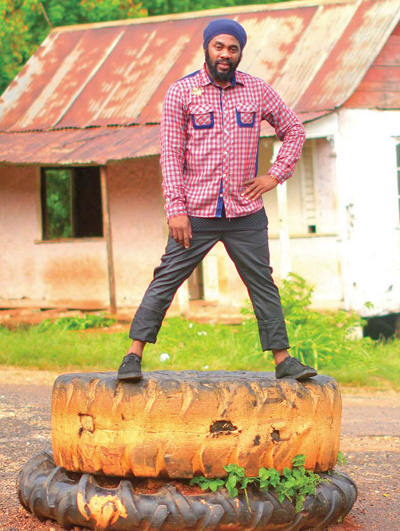 Nice... You’ve been around the world with music at this point, what’s your favorite place that music has taken you?
Nice... You’ve been around the world with music at this point, what’s your favorite place that music has taken you?
Well, in terms of being there, I love everywhere that I’ve been because it’s somewhere different that I’ve never seen before. I hate plane, but I was happy to reach. I like to travel, but I hate plane. Oh, man, me just reach! I just REACH!!! [laughs] Wi a gwaan to Italy and I just reach now! That’s what I like. The ambiance of the people that I’ve met worldwide and the love that they show you, it’s unbelievable, you know? So, I love all the people of the world… people in different cities. In terms of performing, I’ve been to a place named San Diego on the west coast. Believe me, those people got them some Exco Levi… They knew every song and I was like “WHAT?!” Believe me, man!! San Diego and a place named Zurich, Switzerland. Oh, man, those people know EVERY Exco Levi song!! And the next place named Mannheim, Germany. Mannheim, Zurich, San Diego… and the next place close to Hamburg, Hamburg too! They know them Exco Levi, you can’t fool them! Every song they sing! Because some day you go to some city and they might know two songs, they might know two or three in your set. They might know three... but I mean like, EVERYTHING!?! I song? Zurich, San Diego, Mannheim, Germany, they know it. I was like “WOW!” You see Exco Levi CDs in some of these place, but it’s a joy, you know, and I give thanks.
What part of the musical success that you’ve achieved to this point do you find most satisfying on personal level?
No Juno, no tour, nothing… No money more important to me than the fans. Just by Reggaeville say I want to interview Exco Levi for his album... Just by any media a come and say listen... And just by the fans a come and turn up to the show, like last night I did Juno Fest and just by hearing the people respond when me play song. Money can’t buy that. You understand? Money can’t buy that so that’s success to me. That’s when I feel like I’ve achieved, when my album is out and I can see Reggaeville have it up “Exco Levi album is out.” You know? That’s what make me feel good, because it shows that I’m doing work. You know, the people loving what I’m doing and I’m knowing that what I’m doing is nothing negative. It’s just positiveness, you understand? That’s what give me the joy right here [pats his chest with his hand] and I know say, “Yo, Exco, you’re doing something good.” Because I don’t sing curse music. I love all the people of the world, you know? I sing conscious uplifting music… and I”m gonna do that, man. That’s it.
Ok, man. Well, thank you so much and good luck at the Junos tomorrow.




